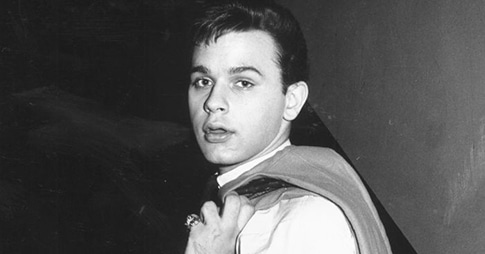The music world has just lost a real pop legend because Lou Christie, 82 years old, the golden voiced teen idol who shot to the top in the 1960s with his breathy performance of dramatic falsetto sounds and melody-memorable songs, has passed away.

On June 17, his family confirmed his death after what they termed as a brief illness. Although the immediate cause of death was not reported, it has put fans, his contemporaries and historians of music on a state of reflection to have a closer look at what the mammoth contribution he gave throughout a musical career that was over half a century long.

Christie was born Lugee Alfredo Giovanni Sacco, on 19 February, 1942, in the tiny Pennsylvania steel town of Glenwillard. Having been brought up in a working-class family of Italian-American, he started to sing at his church choir and soon enough found out that his voice, at least, his falsetto could make people freeze.

He made that discovery, as he recalls with affection in a 2016 interview, when at a Christmas pageant as a first-grader he sang Away in a Manger. He did not forget the reaction of the crowd. He had an idea that everybody could sing. I was so surprised: when I finished I heard all this applause and I was like, I said, Oh, what is this? It is like this is kind of cool.’”

That cool feeling became a passion in a lifetime. Having no professional music lessons or teaching of any kind, Christie found how to master with his gift by the sheer instinct, his fascination with harmony and singing, and a sheer will to be heard.

Some of his early demos were even recorded in a small two-track studio in Glenwillard which is least compared to New York or Los Angeles production plants. However, their raw genuineness in such early songs also drew the interest of record executives and in no time, Lou Christie was born.

In 1963 he scored with the eerie romantic ballad, The Gypsy Cried, a song that featured his emotional performance and high falsetto vocals. It reached 24th on Billboard Hot 100, which made Christie an artist to watch.

Shortly after that he put out Two Faces Have I and this song was even more successful, reaching the no. 6 spot, and underlining his position as a new pop contender.

However, it was the legendary 1966 single entitled Lightnin Strikes that brought Christie to the pop music history. A brash, pulsing number that he had co-written with veteran collaborator Twyla Herbert, the song was a rapid-tempo, theatrical use of strings (somewhere between Henry Mancini and Stephen Stills, but mostly indeed like Stephen Stills),

the most important element of which was, Christie fully in control of his vocal range, unleashing the falsetto. It was not purely catchy but exciting. It was on Christie 23rd birthday that his song, Lightnin Strikes, reached No. 1 on the Billboard that made the day memorable.

The success of the song was a peak of a music scene which was still getting more experimental and eclectic. As the British Invasion was reinventing pop-music in America, Christie found her own niche with her pop-wail contralto mixed with operative,
doo-wop, and rock. He told romantic tales and played songs with his heart on his sleeve; these appeals to the audience, especially adolescent girls who perceived the singer as his musical artist and heartthrob.

Christie managed to maintain the hits and over the years gave the world another hit song such as, Rhapsody in the Rain, which came under fire with its risque lyrics, and another top 10 song, I Gonna Make You Mine, which was the evidence that he was not a one hit wonder.
His songs tended to straddle the border between adolescent soap opera and emotional reality, which most modern musicians are yet to master.

In addition to the charts, Christie made television and tour circuit appearances, and shared the stage with rock and roll legends The Rolling Stones, The Beach Boys, and with Neil Diamond. He played on ”
American Bandstand ” and similar music programs, his charisma and theatre shows won him a nationwide army of supporters.
Christie never retired from performing even after he reached the pinnacle of his mainstream appeal. Later, he still toured the U.S., in his 70s and early 80s, making frequent appearances at nostalgia concerts

and old fashioned festivals. Even in 2023, he was still performing on stage in front of the audience, overcoming the boundaries of age due to his voice, which was in a great condition, still able to touch the crowd.
During interviews, he attributed his long-lasting vocal to clean lifestyles. I am a non liquor drinker, non smoker or visiting various places where the music is too loud and you have to holler to get a conversation going together, he once clarified. That does not appeal to me.
I am a calm person, and I believe that that is all helpful.” He is so health conscious, balanced and genuine to specific that he became a role model even to younger artists in the music industry but also to fans who had known his music since childhood.

After the news of his death, his family issued a touching letter on his official Instagram page. The statement also read: with great sorrow we announce the departure of our dearest brother, Lou Christie, which passed away after a short illness.
Not only his family and close friends loved him, but also many fans whose lives he made a bit lighter with his affability and generosity, artistic and musical excellence, irreverence and vitality. His loss is like an everlasting gap in everybody s heart.”

Besides the massive contribution he had in music, Christie was a family man. His wife Francesca and their two children remain his survivors and in later years the couple used to travel on the road frequently. Camerally, he had a reputation as a warm person who would make time to meet fans and even mentor young artists who were inexperienced in the world of music business.
The death of Lou Christie is more than celebrating the demise of another oldies pop-chart maker. It is the muffling of a voice that had the audacity to be different, a voice that broke conventions, and a voice

that made listeners have some reason to believe why music has the power to wrench out emotions. His falsetto might not be heard any more in musical concert halls but his recordings, those high-flying, pleading, heart-felt songs remind us all of a man who dwelt to sing.

Good night, Lou Christie. You left something memorable to the world. The music is still alive.
Related



